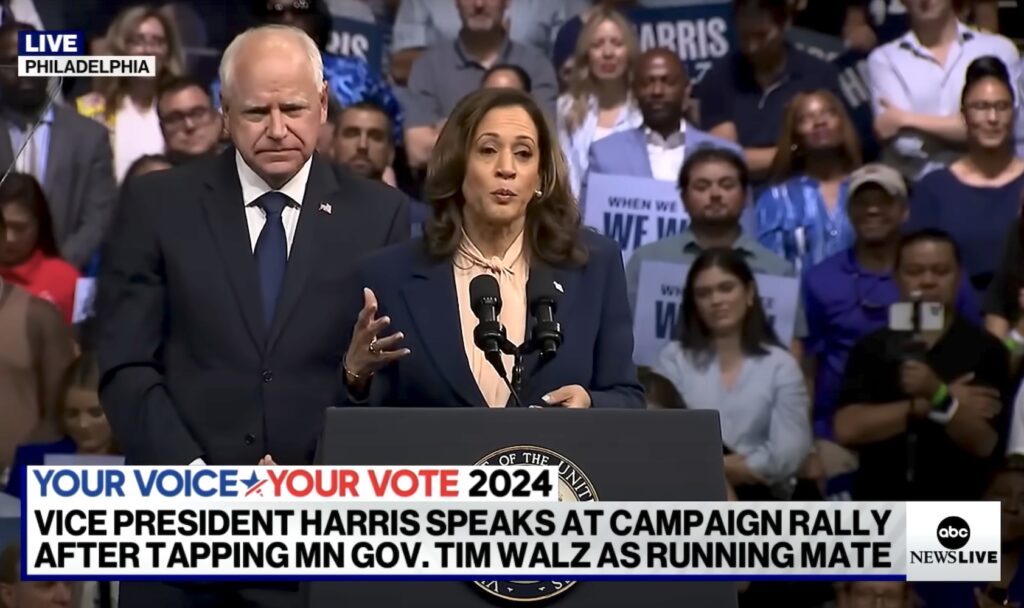Under Gov. Walz, Minnesota denied parents’ rights with trans sanctuary law, gender pledge for teachers
Under presumptive Democratic vice-presidential nominee Gov. Tim Walz, two controversial measures negating parental rights in gender dysphoria cases took effect in Minnesota last year.
The first…

Under presumptive Democratic vice-presidential nominee Gov. Tim Walz, two controversial measures negating parental rights in gender dysphoria cases took effect in Minnesota last year.
The first law passed by the Legislature and approved by Walz allows Minnesota courts to effectively take custody of some out-of-state children if parents refuse gender transition treatment for them.
Walz signed the law, HF 146, in April 2023. It says children who were residents of Minnesota “within six months before the commencement of [a custody] proceeding” – even if now out of state – are subject to the custody decisions of the Minnesota courts for the purposes of practicing transgender medicine.
The court, under the new Minnesota law, has custody in cases even if one parent “or a person acting as a parent, have a significant connection with this state other than mere physical presence” (emphasis added).
In other words, the complainant doesn’t need to live in Minnesota.
It goes further, in that even if the custody dispute involves the illegal removal of a child from one state to another, Minnesota will not recognize a subpoena if it involves a case where a parent denied sex change treatment for children.
“(a) No subpoena shall be issued and no foreign subpoena shall be recognized in this
state in a criminal or civil matter if the subpoena is related to a violation of another state’s laws when the other state’s laws are designed to interfere with an individual’s right to receive gender-affirming health care.”
In three places the law specifically forbids the governor of Minnesota, or law enforcement officials of that state, to surrender any person wanted for extradition to any jurisdiction “for acts committed in this state related to receiving or providing gender-affirming health care.”
The law also excludes the arrest of any person “if the accused stands charged in the courts of any other state for acts committed in this state related to receiving or providing gender-affirming health care … or assisting another person in receiving or providing this care” (emphasis added).
But the LGBT lobby wasn’t done after HF 146 was signed into law.
In August, the Minnesota Professional Educator Licensing and Standards Board (PELSB) approved professional standards for teachers that critics say violate religious conscience provisions of the U.S. Constitution by requiring teachers to adhere to progressive dogma in child transgender cases.
The new standards also appear to violate the parental right to be involved in their child’s medical care.
The proposal for the new standards was reported by The Lion last year.
“The teacher fosters an environment that ensures student identities such as race/ethnicity, national origin, language, sex and gender, gender identity, sexual orientation, physical/developmental/emotional ability, socioeconomic class, and religious beliefs are historically and socially contextualized, affirmed, and incorporated into a learning environment where students are empowered to learn and contribute as their whole selves,” says the new PELSB standard.
In essence, the standards require teachers to affirm sexual and gender identity for kids in the classroom, without any parental involvement.
“We have lots of parents who are upset by this sort of thing in schools already,” Doug Seaton, president of Upper Midwest Law Center (UMLC), told The Federalist. “They’re going to be even more upset with how their teachers are going to be licensed. Their teachers are going to have to be faced with hiding their beliefs or getting denied.”
The standards apply to all new licensed teachers and “teachers seeking an initial Tier 3 license.”
The standards also contain diversity, equity and inclusion language.
Teaching styles must be “anti-racist, culturally relevant,” and “create opportunities for students to learn about power, privilege, intersectionality, and systemic oppression in the context of various communities and empowers learners to be agents of social change to promote equity,” says the PELSB four-color manifesto containing the new standards.
“Oppression” or “oppressive systems” are mentioned three times in the standards, while the words “testing” “achievement” and “grades” never appear.
Previously The Lion reported that Minnesota has struggled with test scores and learning losses in K-12 public schools under Walz.
“So, there’s been watering down of our teacher licensing requirements, and there’s concern that that is impacting student performance in the classroom,” Catrin Wigfall told The Lion.



